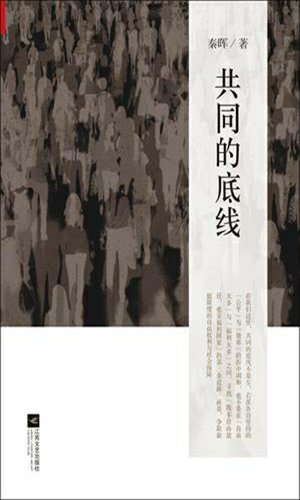Too early for right and left to struggle in China’s underdeveloped society

Long before the May Fourth Movement in 1919, there was a clash between Chinese culture and Western culture in China. Over 100 years has passed since the end of the old Chinese dynastic era, and China has entered an era of reform and opening-up.
Ideological struggle has gradually faded out after the end of the Cold War globally, but domestically, there are increasingly disputes between different ideas, caused by the further development of reform and growing social contradictions.
In his book The Common Baseline of Modern Thought, published by Jiangsu Literature and Art Publishing House in March 2013, Qin Hui, an economic historian best known for his agrarian studies and a professor at the School of Humanities and Social Sciences at Tsinghua University, holds that instead of having fierce ideological debates, the most pressing need is to seek a shared baseline of values.
Qin analyzes the development of political ideas in China in his book, including utopianism, populism, economic discussions on social justice and institutional innovations.
He finds that the debates between scholars from different camps are becoming fiercer and people even cannot sit down calmly to reason with others. They are increasingly prone to use extreme utterances to attack others' political views.
Against such background, it is particularly important for people with various political ideas to seek a common baseline.
Qin examines divided views in the West. Western left-wingers advocate expanding the responsibilities that governments should take while right-wingers hold that governments' power should be limited.
However, the premise of such confrontation is that there's already a "state" that has a shared social contract.
Under that contract, the state's power corresponds exactly to its responsibilities. Power is granted by citizens and should be responsible toward citizens.
Obviously, a "state" in this sense can only be a democratic one. Only in this context can the left's argument of expanding governmental responsibility and the right's argument of reducing governmental power be in opposition.
Without such premise, power will not be produced by the social contract or granted by citizens. Then the state will enjoy great power but discharge few obligations and a productive antagonism cannot be formed.
In China, the left and right also have contrary views on lots of topics. For example, one group accuses the US of having too much individual freedom while the other holds that Swedish social security has problems.
However, currently, our social security system is much weaker than the US and our personal freedom cannot keep up with Sweden.
It is of no significance for us to seek a middle line between US freedom and Swedish social security.
To maintain a minimum level of freedom and social security, we should first establish a democratic system in which power can correspond to responsibilities. This is the common baseline that both sides should stick to.
In short, Qin holds that it is too soon for us to take a stand. In present-day China, there are many overlapping values between different political ideas.
Qin's common baseline is based on the coexistence of diverse cultures. He particularly emphasizes that a common baseline cannot equal "a third way."
A common baseline in China means that we advocate the basic values that both liberalism and social democracy approve, and oppose the values that both liberalism and social democracy fight against. We should find the overlapping places, because these shared values are the basic foundation of the development of human civilization.
Publishers or authors of new works for review related to Asian affairs are invited to contact us at shumeng@globaltimes.com.cn.